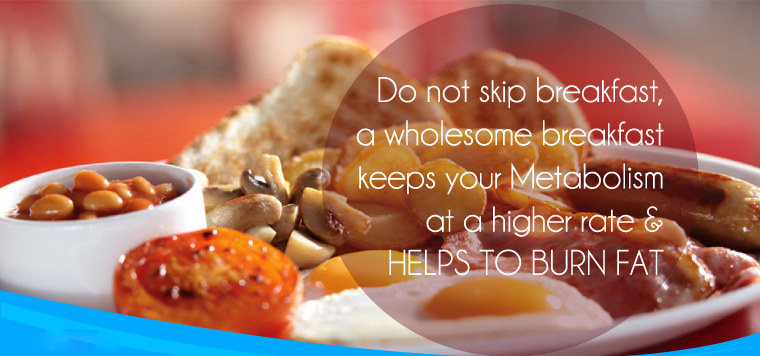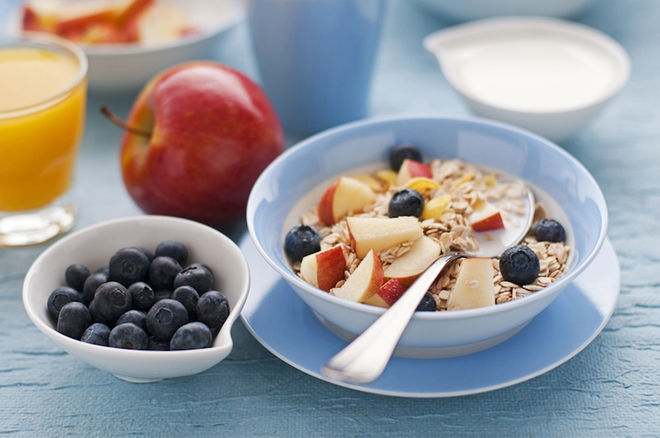A new study shows that eating breakfast every single day is a key behavior among people who average a 60-pound weight loss and have kept it off for six years. The study in the Journal of Obesity Research was an ongoing look at successful maintainers of significant weight loss.

Nearly 80 per cent of them eat breakfast everyday as part of their routine to stay slender. Cereal was their favorite choice. Nutritionists suggest starting the day with whole grains such as oat meal or brown rice which are low on the glycemic index. These satisfying foods do not cause a sudden rise in blood glucose. Instead, they tend to hold off hunger for several hours because they are absorbed slowly into the bloodstream.
Breakfast can make or break a diet, because breakfast helps set the tone for the rest of the day. If you’re one of those people who thinks skipping breakfast is a good way to lose weight, think again. Here are the top reasons why you should definitely eat breakfast every day:
![]() Break the fast. What does “breakfast” mean? Your body responds to not eating for hours and hours by “slowing down”; diminishing its metabolic rate and burning fewer calories to conserve energy. By eating breakfast, you wake up your metabolism and get your engine humming, burning those calories you need to burn to lose weight.
Break the fast. What does “breakfast” mean? Your body responds to not eating for hours and hours by “slowing down”; diminishing its metabolic rate and burning fewer calories to conserve energy. By eating breakfast, you wake up your metabolism and get your engine humming, burning those calories you need to burn to lose weight.
![]() Eat more, weigh less. Researchers have repeatedly shown that people who eat breakfast have a better chance of losing weight, and keeping it off. When you skip meals, you’re so hungry by lunchtime you eat the entire cow! The National Weight Control Registry shows that among those who’ve lost 30 or more pounds and have kept it off more than a year, 90 percent report eating breakfast most days of the week.
Eat more, weigh less. Researchers have repeatedly shown that people who eat breakfast have a better chance of losing weight, and keeping it off. When you skip meals, you’re so hungry by lunchtime you eat the entire cow! The National Weight Control Registry shows that among those who’ve lost 30 or more pounds and have kept it off more than a year, 90 percent report eating breakfast most days of the week.

![]() Do better at work and school. Breakfast helps wake you up. Studies show that people who eat breakfast are more alert and do better on tests than people who skip breakfast. Eating breakfast helps “improve memory and positively affects the tasks that require the retention of new information. Conversely, a hungry child can be apathetic, disinterested, and irritable when confronted with difficult tasks. Breakfast is the key.” No doubt adults need breakfast as much as kids do.
Do better at work and school. Breakfast helps wake you up. Studies show that people who eat breakfast are more alert and do better on tests than people who skip breakfast. Eating breakfast helps “improve memory and positively affects the tasks that require the retention of new information. Conversely, a hungry child can be apathetic, disinterested, and irritable when confronted with difficult tasks. Breakfast is the key.” No doubt adults need breakfast as much as kids do.
![]() Breakfast is your chance to eat the foods you may not eat the rest of the day. You can’t go wrong with a whole-grain cereal and berries with nonfat milk — here is your fiber,folic acid and calcium in one easy-to-grab bowl.
Breakfast is your chance to eat the foods you may not eat the rest of the day. You can’t go wrong with a whole-grain cereal and berries with nonfat milk — here is your fiber,folic acid and calcium in one easy-to-grab bowl.
![]() Skipping breakfast makes you grouchy. Studies show that people who eat breakfast tend to be in better moods. Breakfast gets you started on the right track for the day. If you start out with a healthy breakfast, then you set the mood for lunch. You’re more likely to choose something reasonable for lunch if you’ve paid some attention to your breakfast choices.
Skipping breakfast makes you grouchy. Studies show that people who eat breakfast tend to be in better moods. Breakfast gets you started on the right track for the day. If you start out with a healthy breakfast, then you set the mood for lunch. You’re more likely to choose something reasonable for lunch if you’ve paid some attention to your breakfast choices.

![]() Cancel the danish or sugared doughnut first thing in the morning; they cause a blood sugar dip a couple of hours later. You’ll be desperate for something to perk you up, and will be more likely to grab another high-sugar refined carb for a quick sugar rush.
Cancel the danish or sugared doughnut first thing in the morning; they cause a blood sugar dip a couple of hours later. You’ll be desperate for something to perk you up, and will be more likely to grab another high-sugar refined carb for a quick sugar rush.
![]() Breakfast makes your machine run better. Get yourself on a schedule with a healthy breakfast, and you’re ready to take on the world.
Breakfast makes your machine run better. Get yourself on a schedule with a healthy breakfast, and you’re ready to take on the world.
![]() Set a good example for your children. By skipping breakfast, your kids will think it’s not important. Breakfast doesn’t have to be a big affair, but don’t wimp out. Make it a habit, and your kids will be way ahead of the game, too.
Set a good example for your children. By skipping breakfast, your kids will think it’s not important. Breakfast doesn’t have to be a big affair, but don’t wimp out. Make it a habit, and your kids will be way ahead of the game, too.
![]() Don’t eat dessert for breakfast. If you think a glazed doughnut or a breakfast bar with 30 grams of sugar are breakfast items, then think again. Doughnuts are fried lumps of sugared dough, and many breakfast bars should be labeled “candy bars” instead.
Don’t eat dessert for breakfast. If you think a glazed doughnut or a breakfast bar with 30 grams of sugar are breakfast items, then think again. Doughnuts are fried lumps of sugared dough, and many breakfast bars should be labeled “candy bars” instead.
![]() Watch out the labels. “Nutritious,” doesn’t necessarily always mean healthy. Cereal manufacturers are experts in marketing, using words that send a message of health. Unless you read the labels, you eat at your own risk. Kids’ cereals can have more sugar than candy. Protect your kids from getting hooked on these cereals; they’ll get used to all the sugar, and will want only pre-sweetened cereals.
Watch out the labels. “Nutritious,” doesn’t necessarily always mean healthy. Cereal manufacturers are experts in marketing, using words that send a message of health. Unless you read the labels, you eat at your own risk. Kids’ cereals can have more sugar than candy. Protect your kids from getting hooked on these cereals; they’ll get used to all the sugar, and will want only pre-sweetened cereals.

Buy cereals that have minimal sugar such as regular Cheerios, not honey nut or other sweetened versions; corn flakes, not frosted flakes; shredded wheat minis, not frosted and sugared; and look into some of the newer, healthier cereals like Kashi (the unsweetened kind). Then let your taste buds rule. Add your own sugar. I guarantee what you or your kids add will be a fraction of what the cereal guys add — sometimes up to eight or nine equivalent teaspoons per one-cup serving.
![]() What you SHOULD be eating (and enjoying it, too):
What you SHOULD be eating (and enjoying it, too):
- Eat cereals that are low in sugar. Cereal with milk is a great breakfast. It really is a good all-around meal. Remember – low or no sugar is what you want.
- Eat eggs, they are good for breakfast. Eat eggs, but eat them in moderation, of course.
- Try a new egg sandwich. You can put cheese or ham on yours. Use your imagination, these are really fun to make. Be creative.
- Eat pancakes. Yes, they are great from time to time. Try to get yourself one of those griddles that you don’t need to add fat too. That way you’ll be able to eat these pancakes more often. To cut down on calories (and that’s what you want), instead of using butter and syrup, put fresh fruit on yours.
- Eat old-fashioned toast. Toast is still a great thing to eat. Just make sure you don’t load it up with too much butter or similar things.
- Eat oatmeal. Add some milk if you want and a bit of sugar and you have a breakfast that will stick to your ribs!
- Drink juice when you have breakfast! Trust me, you don’t need coffee in the morning; you can get morning energy by just drinking juice. And you don’t have to worry about getting the shakes if you drink too much of this juice.
-
Fruit salads can be great for breakfast. Just throw your favorite fruits together and call it a meal! There you go. Enjoy it, and make sure you show your friends this wonderful meal.
Disclaimer
The Content is not intended to be a substitute for professional medical advice, diagnosis, or treatment. Always seek the advice of your physician or other qualified health provider with any questions you may have regarding a medical condition.



